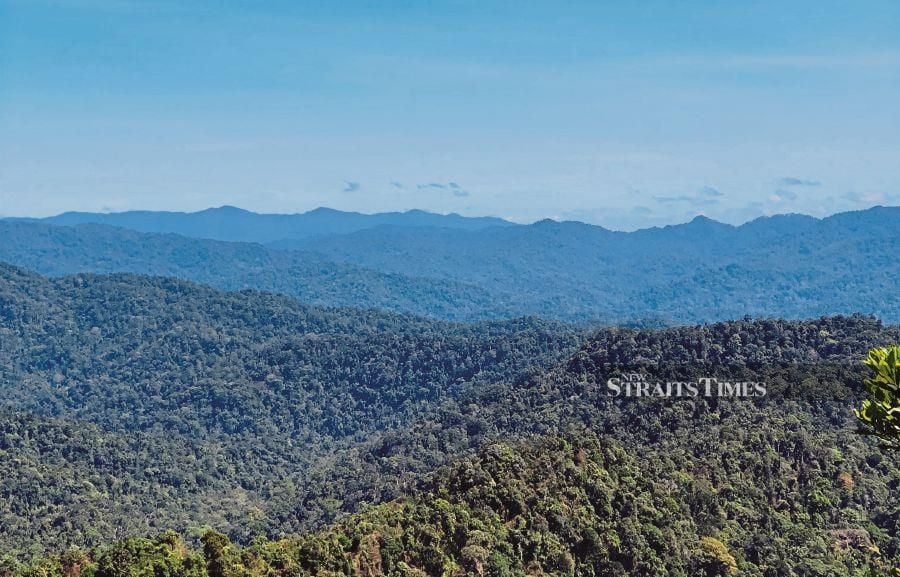
MALAYSIA is richly endowed with natural resources, blessed with fertile soil and abundant rainfall throughout the year.
Malaysia is ranked as one of the 17 mega-biodiversity countries in the world and its forests are rich in valuable timber species.
Forests provide water and soil conservation, flood and drought mitigation, combat global warming and other environmental services.
All these ecosystem services are of vital importance for food and water security, not only for domestic and industrial water consumption, but also for irrigation and generation of hydro-electricity.
A sustainable forest management (SFM) is central and is seriously pursued in Malaysia by the relevant ministries and agencies.
In spite of what has been alleged by certain groups, Malaysia is still a green country with 54 per cent of its land area under forest cover, the bulk of which has been legally constituted as PRFs (permanent reserved forests) and TPAs (totally protected areas) to ensure forest cover.
And more importantly, in order to ensure that the country remains green, Malaysia made a commitment at the historic Earth Summit in 1992 that its forest cover will always remain
more than 50 per cent of its land area.
Such a threshold will limit forest conversion into other forms of land uses even though agri-conversion may offer exciting prospects.
This important policy decision on land use was made to strike a judicious balance between environmental and economic considerations.
Such a policy is in line with the 17 Sustainable Development Goals adopted by the United Nations in 2015 which also include caring for the environment and eradicating poverty.
It is within the context of poverty alleviation that conversion of forests into productive agriculture has been implemented.
Those benefiting from such land development programmes include a million smallholders through oil palm and rubber cultivation.
To give effect to Malaysia’s commitment to sustainably manage its PRFs, a National Committee on Sustainable Forest Management was established in 1994 to operationalise the International Tropical Timber Organisation (ITTO) Criteria for Sustainable Management of Tropical Forest.
This commitment to SFM was further demonstrated with the creation of the Malaysian Timber Certification Council (MTCC) in 1999 to certify that timber felled in a logging area can be sustainably grown again.
Forest certification must of course be linked to the objectives of SFM which is defined by the ITTO as:
“Sustainable forest management is the process of managing permanent forest land to achieve one or more specified objectives of management with regard to the production of a continuous flow of desired forest products and services without undue reduction of its inherent values and future productivity and without undue undesirable effects on the physical and social environment.”
With the full cooperation of the Forestry Department, MTCC started operating in some states at the end of 2001 using a phased approach.
The standards contain only the key elements of SFM, which are embracing economic, social, environmental and conservation aspects.
It also incorporated corresponding standards of performance for Sabah, Sarawak and Peninsular Malaysia adopted by consensus during regional- and national-level stakeholder consultations.
There are two international schemes on forest certification, which are the Forest Stewardship Council and the Programme for the Endorsement of Forest Certification.
What is the status of forest certification of PRFs inMalaysia?
What is our situation in the global context of forest certification?
There are some four billion ha of forests in the world which are more or less equally distributed between tropical and non-tropical forests.
Globally, at the end of 2018, 24 per cent of non-tropical forests have been certified compared to a meagre 1.8 per cent of tropical forests.
Malaysia can be proud as 35 per cent of our PRFs have been certified and our forest managers are doing their utmost to strengthen forest management so that other areas may also be certified.
SFM of the tropical forests is most challenging as it needs skills and resources, both human and financial, apart from political support.
All these are inadequate in many developing tropical countries. Hence the meagre area of tropical forests certified.
The process of SFM in Malaysia has brought closer engagement between all stakeholders and forest managers through consultations to formulate forest management plans and develop standards for certification.
There is, therefore, greater understanding between stakeholders, especially social and environmental NGOs, who often hold divergent views.
Forest managers and industry groups can also make their views and difficulties known.
All these views have to be carefully understood by stakeholders so that a spirit of cooperation may be struck to achieve the objectives of SFM and subsequently, independently audited to ensure compliance with the standards adopted by stakeholders.
These processes undoubtedly contribute to the development of forest-caring.
Only a forest-caring society can ensure future generations will inherit and enjoy our precious forests and vital ecosystem services.
As a responsible member of the international community, we will not neglect our commitment to combat global warming through SFM and adequate forest cover.
The writer is the former chairman of the Malaysian Timber Certification Council
Source : NST

